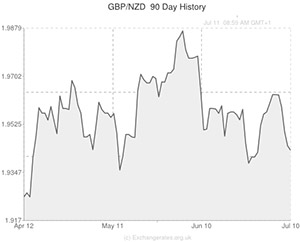
On Friday the Pound to New Zealand Dollar (GBP/NZD) exchange rate registered a 0.2% decline as the ‘Kiwi’ maintained a bullish relationship with several of its currency counterparts and Sterling stagnated.
The USD/NZD exchange rate was also brushing a three-year low as the prospect of a long delay before the first US interest rate increase limited demand for the ‘Greenback’.
While the Reserve Bank of New Zealand is currently engaged in a gradual-yet-steady interest rate hiking cycle, both the Federal Reserve and Bank of England are reluctant to commit to a timeline for increasing borrowing costs.
Consequently, the New Zealand Dollar has been able to maintain a stronger position against peers like the Pound and US dollar.
The ‘Kiwi’ also strengthened to a 13-month high against a struggling Euro following a Portugal-focused spot of risk aversion.
According to forex trader James Davies; ‘It is mainly through the strength of the ‘Kiwi’ and slight weakness in the Euro overnight – the ‘Kiwi’ is on a high and not showing any sign of weakness yet. The trend is high but the ‘Kiwi’ is in rarefied air up here and certainly represents value for importers, so you could see some real money flows out of the Kiwi and into foreign currencies at levels like this.’
Overnight New Zealand’s Food Price report showed a 1.4% month-on-month increase in June. This was over double the 0.6% monthly increase recorded in May.
Heightened demand for dairy produce saw the cost of grocery goods climbing by 0.5% on a monthly basis.
On the year food prices were up by 1.2%.
According to industry experts, the rising cost of both meat and fresh vegetables was a contributing factor to the climb in prices.
The report prompted this response from Statistics New Zealand; ‘The average retail price for the cheapest available 2 litre blue-top milk was 3.62 New Zealand Dollars in June 2014, compared with 3.19 New Zealand Dollars in June 2013.’
Separate data showed that New Zealand’s Non Resident Bond Holdings came in at 64.2% in June, down from 64.6% in May.
The decline in the Pound to New Zealand Dollar (GBP/NZD) exchange rate also occurred as a result of data outlining a disappointing slide in the level of construction output in the UK.
However, demand for the higher-risk ‘Kiwi’ was a little tempered by developments in Ukraine and Portugal.
Before markets close for the weekend additional USD to NZD movement could be caused by the US Monthly Budget Statement.
New Zealand Dollar (NZD) Exchange Rates
[table width=”100%” colwidth=”50|50|50|50|50″ colalign=”left|left|left|left|left”]
Currency, ,Currency,Rate ,
New Zealand Dollar, ,US Dollar,0.8824,
,US Dollar,0.8824,
New Zealand Dollar, ,Euro,0.6484,
,Euro,0.6484,
New Zealand Dollar, ,Australian Dollar,0.9390,
,Australian Dollar,0.9390,
New Zealand Dollar, ,Pound Sterling,0.5148,
,Pound Sterling,0.5148,
US Dollar, ,New Zealand Dollar,1.1337,
,New Zealand Dollar,1.1337,
Euro, ,New Zealand Dollar,1.5420,
,New Zealand Dollar,1.5420,
Australian Dollar, ,New Zealand Dollar,1.0654,
,New Zealand Dollar,1.0654,
Pound Sterling, ,New Zealand Dollar, 1.9429,
,New Zealand Dollar, 1.9429,
[/table]

Comments are closed.